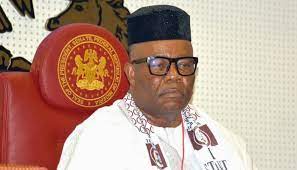Featured
SERAP to CCB, ICPC: Prosecute deputy speaker over alleged N1.1bn water contract scam
Published
8 years agoon
By
Olu Emmanuel
Socio-Economic Rights and Accountability Project (SERAP) has asked the Acting Chairmen of both the Code of Conduct Bureau (CCB) and Independent Corrupt Practices and Other Related Offences Commission (ICPC) “to jointly investigate allegations of incompatibility, apparent conflict of interest and abuse of office involving Deputy Speaker of the House of Representatives, Mr. Lasun Yusuff using his personal company to win water contracts amounting to about N1.1 billion from the Ministry of Water Resources, and to collaborate with the Economic and Financial Crimes Commission (EFCC) in any such investigation.”
The organization urged the anti-corruption agencies to “prosecute Mr Yusuff and other people and companies suspected to be involved if there is relevant and sufficient admissible evidence of abuse of office and complicity against them. We urge you to take steps within 14 days of the receipt and/or publication of this letter, failing which SERAP will institute legal proceedings to compel the government of President Muhammadu Buhari to order your agencies to act in the public interest.”
In the petition dated 8 June 2018 and signed by SERAP deputy director Timothy Adewale, the organization said: “Investigating the allegations and prosecuting all those suspected to be involved would indicate your agencies’ willingness to exert your authorities and act as a deterrent against breaches of the code of conduct provisions, Nigeria’s anti-corruption legislation and international standards.”
The organization said, “Public officials allegedly securing to themselves and/or their companies and family members privileges rightly belonging to the public by by-passing or manipulating the formal procedures necessary for the award of these privileges is a textbook case of conflict of interest.”
The organization expressed “Concerns that Mr Yusuff’s alleged acts suggest abuse of his position as lawmaker, and apparent conflict of interest situation, as such acts were undertaken by the Deputy Speaker in the exercise of his legislative functions to presumably promote and advance the commercial and other interests of his own, Nur and Company Nigeria limited.”
According to the organization, “Rather than using his law-making functions to promote access to safe drinking water and sanitation services for Irepodun/Orolu/Olorunda/Osogbo Federal Constituency without any discrimination or disparity in the level of services, the Deputy Speaker would seem to be looking after his own interests and Nur and Company Nigeria limited–not those of the constituency he represents.”
The petition reads in part: “Bidding and winning the water project contract and the alleged mismanagement and/or stealing of about N1.1 billion meant to execute the project may have violated constitutional provisions and international standards on code of conduct for public officers and the Public Procurement Act.”
“SERAP notes that the Nigerian Constitution 1999 (as amended) and UN Convention against Corruption to which Nigeria is a state party prohibit conflict of interests and set ethical standards for public officers, including lawmakers. Both the Constitution and the Convention require public officers to abstain from all acts that may compromise the exercise of their public functions and are inconsistent with their entrusted positions.”
“Under article 19 of the convention, abuse of functions refers to a public official that is doing something which is illegal or something that the official has no legal authority to do, to obtain a personal economic benefit or cause an illegal damage to others. Article 13 requires the maintenance of transparent, competitive and efficient procurement systems as part of the measures against corruption.”
“Public officers also must discharge their public duties truthfully and faithfully, abide by the constitutional code of conduct, observe the primacy of public interest, and not allow their personal interest to influence their official conduct. SERAP believes that rather than serving the common interest of the public, the use of the personal and family company–Nur and Company Nigeria limited—to win over N1 billion water project contract would seem to put Mr Yusuff in a conflict of interest situation.”
“Conflict of interest represents a situation where the person exercising a public function such as law-making duties has a personal interest of patrimonial or commercial nature, which could influence the objective fulfilment of the duties incumbent on public officers.”
“The allegations of abuse of office and corruption have denied the communities affected the right of access to safe drinking water and sanitation, thereby exacerbating unequal access to drinking water and sanitation for the people of the constituency and Osun State in general. Such allegations also violate the International Covenant on Economic, Social and Cultural Rights, which guarantees the right to an adequate standard of living including the rights to water and sanitation. Nigeria has ratified the Covenant.”
“While the Constitution of Nigeria does not explicitly recognise the human rights to water and sanitation, the rights can be inferred from section 33 which guarantees the right to life. SERAP believes that the right to life includes the right to safe drinking water and sanitation, and to human dignity. Denying the affected communities access to drinking water also amounts to violating the people of the constituency’s right to life.”
“The human right to safe drinking water entitles everyone to sufficient, safe, acceptable, physically accessible and affordable water for personal and domestic uses. Alleged embezzlement, misappropriation or other diversion of property prohibited under article 17 of the UN Convention against Corruption amounts to violations of the obligation to fulfill the human right to water.”
“According to reports, the Deputy Speaker allegedly used his personal company to win contracts amounting to about N1.1 billion from the Federal Government through the Ministry of Water Resources. Lasun, during his first term in the House, used his personal company – Nur and Company Nigeria limited, to bid and win two mini-water schemes in Osun State, as advertised on behalf of the ministry by the Ogun-Osun River Basin Development Authority.”
“The contracts, which are part of the National Assembly’s Zonal Intervention Projects (ZIP), otherwise known as “constituency projects,” were parts of the joint projects attracted to the state by 12 members of the National Assembly from Osun State, who had been elected to the two chambers between 2011 and 2015. Mr Yusuff, who represents Irepodun/Orolu/Olorunda/Osogbo Federal Constituency, and who was then the Deputy Chairman of the House Committee on Water Resources, allegedly used his position to bid and win the contract without the knowledge of his colleagues.”
“The Ogun-Osun River Basin Development Authority (OORBDA), reportedly said that it awarded the Ife-Odan scheme at the sum of N538,412,653.06; Ila-Orangun at the rate of N539,128,429.13 while N541,193,861.23 was approved for Ipetu Ijesha project. Several years after the award of the contract, it was yet to produce a drop of water. The Osun State Water Corporation in 2016 rejected the projects at Ife-Odan and Ila-Orangun, insisting that the contracts were not adequately executed.”
“According to reports, searches at the Corporate Affairs Commission (CAC), allegedly revealed that Nur and Company Limited belongs to the Deputy Speaker as a director, with his wife – Mrs. Omowunmi Rasheeda Yusuff and his three children – Ayomide, Feyisara and Rasheeda – also serving as shareholders and directors.”
“SERAP therefore urges you to carry out joint investigation and prosecution in collaboration with the EFCC of the allegations of conflict of interest and apparent misuse of public funds by Mr Yusuff as highlighted above, and to recover any stolen public funds. Such investigation and prosecution would help to improve public confidence in public authorities and minimize the risks of bad government by public officials.”
You may like


SERAP protests FG must drop cybercrimes charges against Chioma Okoli


SERAP develops 10-Point Action Plan on Promoting Transparency and Accountability in the Use of Public Funds in Nigeria with Focus on the Niger Delta


SERAP issues Tinubu 48 hours to reverse ban on media coverage of State House


SERAP threatens to sue Akpabio over ‘holiday allowances’ to Senators


SERAP, others drag NBC to court over fines on AIT, 2 others


CAMA: Remove repressive provisions or face legal action, SERAP tells Buhari
Trending

 Entertainment5 days ago
Entertainment5 days agoSimi addresses resurfaced 2012 tweets amid online backlash

 Health1 week ago
Health1 week agoSCFN, LUTH introduce bone marrow transplants as curative treatment for sickle cell

 Health4 days ago
Health4 days agoDeclassified CIA memo explored concealing mind-control drugs in vaccines

 Football1 week ago
Football1 week agoHarry Kane nets brace as Bayern edge Frankfurt 3–2 to go nine points clear

 Football1 week ago
Football1 week agoLate Flemming header stuns Chelsea as Burnley snatch 1–1 draw at Stamford Bridge

 Crime4 days ago
Crime4 days agoSenior police officers faces retirement after Disu’s appointment as acting IGP

 Education6 days ago
Education6 days agoPeter Obi urges JAMB to address registration challenges ahead of exams

 Crime1 week ago
Crime1 week agoTwo killed, seven injured in early-morning shooting in Richmond’s Shockoe Bottom

